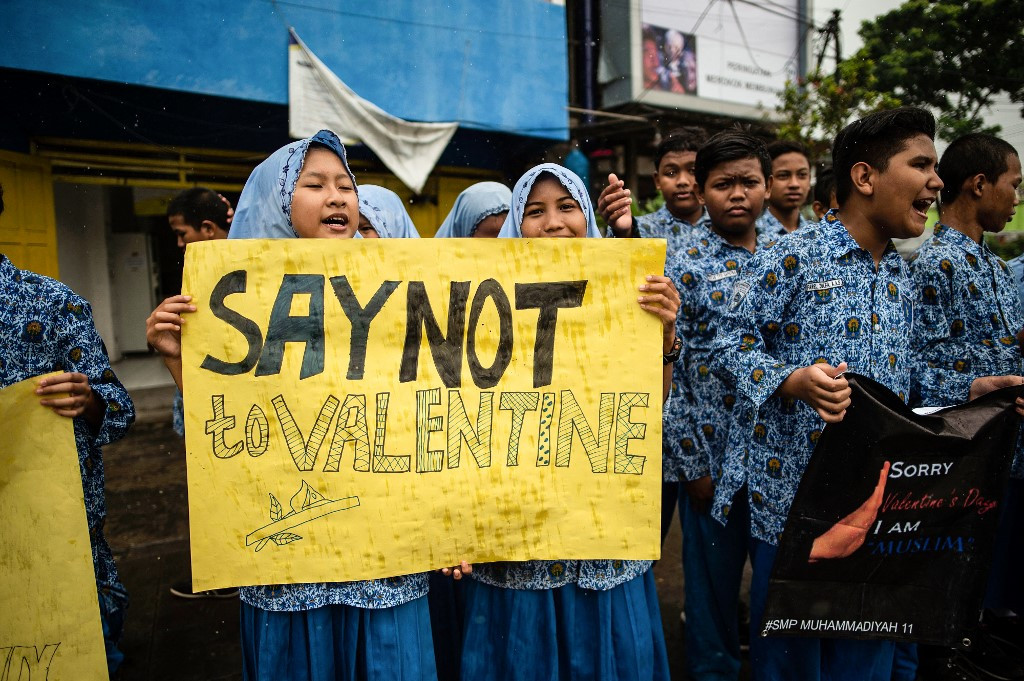Popular Reads
Top Results
Can't find what you're looking for?
View all search resultsPopular Reads
Top Results
Can't find what you're looking for?
View all search resultsThe trouble with Valentine's Day: To celebrate or not to celebrate
Every year, Indonesians get into a spat about Valentine's Day. The Jakarta Post talks to those who celebrate it and those who think it's a sin.
Change text size
Gift Premium Articles
to Anyone
A
s Valentine’s Day approaches and pink decorations start to adorn corners of various spaces, we are once again reminded that the recurring Indonesian controversy of celebrating Valentine might be more familiar to us than the holiday itself.
Early last year, the Bekasi Education Agency in West Java even sent out an official letter prohibiting Valentine’s Day celebrations “in and around the school areas”, encouraging teachers to keep an eye out for those trying to do so. A similar letter was sent by the same authorities from Bangka Belitung Islands to local schools, proclaiming that Valentine’s Day would “destroy the morale and character of students”.
It’s curious that a day supposedly celebrating love is so divisive. Beyond the extremity of boycotting the occasion, however, are nuanced takes on how people truly feel about Valentine’s Day.
Into it/not into it
“I’m quite indifferent to it, but I veer more toward not liking [Valentine’s Day],” said Ilham Akbar, a 17-year-old high school student from Bandung, West Java. The day, he said, suggested that love was only expressed once a year, even though expressing your appreciation to a loved one could be done every day.
“Furthermore, I feel that the occasion is used to solicit sex from one another between the younger generation,” he added.
Aside from cultural and religious reasons, he said he was opposed to sex between people his age over concerns such as unwanted pregnancies or sexually transmitted diseases.
“Even if most of the risks could be prevented by contraceptives and other measures, it’s not a 100 percent guarantee. It’s better to abstain from it rather than be sorry.”
Factors such as the limited extent of sex education in Indonesia is also of concern to him, as he feels that most teenagers lack the proper knowledge on the subject, making them vulnerable. A similar sentiment can be found in a 2019 survey by Reckitt-Benckiser Indonesia, where 73 percent of its teenage respondents agreed that sex education in Indonesia is inadequate.
Terranova Waksman, a 35-year-old cafe owner offers another perspective to the subject.
“In modern times, [Valentine’s Day] is merely capitalist propaganda that produces waste all around the world — only to satisfy unnecessary human needs. I’m not against it per se, I just don’t feel that it’s a necessary thing — the same as other celebrations like Halloween, the racist Thanksgiving or religious celebrations,” she said.
She added that Valentine’s Day added to the stigma of being single or “without a Valentine”, bringing a sense of inadequacy to those not celebrating it in a certain way.
“While Valentine’s Day could be viewed as a celebration for all forms of love, the general convention is that it’s for romantic love,” said Terranova.
On holidays around the year, single people are often shamed for not having a partner, she added.
Indeed, mental health associations such as the Anxiety and Depression Society of America (ADAA) often publish articles close to Valentine’s Day, encouraging people to have realistic expectations for the day and to not get caught up in the marketed perfect romance that comes with it.
A 2020 ADDA article suggested activities such as “[taking] the time to write down a list of the people who have loved you in your life and have shown you care and compassion. Focus upon your gratitude for their influence on your life.”
“It’s just another part of our social life today that I don’t really understand. Sometimes, I don’t even realize that I am also a part of it,” Terranova said.
A couple walks at Lhoknga beach on Valentine's Day, Aceh province on Feb. 14, 2020. (AFP/CHAIDEER MAHYUDDIN)Beyond individual perspectives
Aside from personal perspectives, the renunciation of Valentine’s Day is widespread in Indonesia. Unlike those who dislike it in silence, various groups who actively advocated to boycott Valentine’s Day spring up every year, from youth groups based in schools to religious groups and bigger movements.
Suara Islam (Voice of Islam) is an influential website with a mission to strengthen the fraternity between Muslims and spread the message of amar ma’ruf nahi munkar (enjoining what is right and forbidding what is wrong). Throughout the years, it has consistently published articles about its perspective on Valentine’s Day while advocating against celebrating the occasion.
In its latest Valentine-related article published on Feb. 2, it cited the convoluted history of Valentine’s Day, namely the Paganistic rituals and tragic executions of three different figures named Valentine, as a reason it should not be celebrated.
Partaking in any Valentine’s Day tradition for a Muslim constitutes straying from certain Islamic creeds, such as saving oneself for marriage, A. Ahmad Hizbullah MAG wrote in the article. When asked to elaborate, a representative from Suara Islam declined to comment, pointing only to another article it had published that states: “It is embarrassing for a Muslim to celebrate Valentine’s Day. Without knowing it, they are repeating the foolishness of heathens from centuries ago.”
This anti-Valentine’s Day stance is somehow deeply rooted, evidenced by how every year, there seems to be a need to remind the Indonesian Muslim populace not to celebrate it. On Feb. 8, Indonesian Ulema Council (Majelis Ulama Indonesia) chairman KH Cholil Nafis released a statement that said for Muslims, celebrating love is done by marriage and not with Valentine’s Day.
However, even Muslims who are not into Valentine’s Day, like Ilham, also see something positive about the celebration.
“Because it’s associated with chocolates, Valentine’s Day opens up opportunities for local businesses that sell pastries or the like,” he said.
A business perspective
Armita Sunaryo, 33, is an art school graduate who found her true calling in baking. For her dessert shop Arromanis, Valentine’s Day has always been closely associated with the brand.
“When I first started growing Arromanis seriously, a friend asked me if I had any Valentine’s Day specials that she could order. While I didn’t have any yet, I then developed a pink vanilla cupcake that I still make today,” said Armita.
Since then, Valentine’s Day has been an occasion for which she creates new desserts.
Whenever the day approaches, Armita prepares for a surge of special and custom orders. Like Idul Fitri, Christmas and other beloved holidays, Valentine’s Day provides a boost in sales for Arromanis.
“As a business, I need to respond to what the customers want, and since desserts are associated with Valentine’s Day, the demand has always been there,” she said.
Her customers are mainly teenage girls or young women who celebrate Valentine’s Day and swap gifts with each other. Armita said that she herself used to swap gifts with a group of friends when she was young.
However, Armita conceded that she did not have a specific Valentine’s Day tradition.
“In the past, I had Valentine’s Day dinners with my husband a few times but even then, it was more to support our friends’ businesses rather than celebrate [the occasion],” she said. “I feel that most Indonesians don’t really have a strong attachment to Valentine’s Day. People celebrate it because they get caught up in the mood, seeing pink decorations and flowers everywhere. It’s not that deep, it’s just fun.”










